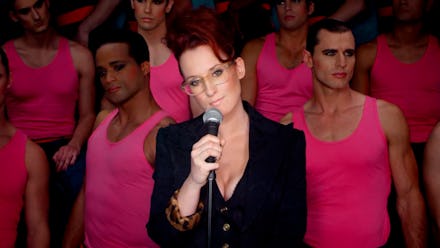In a Brilliant New Video, Ingrid Michaelson Perfectly Parodies Sexism in Pop Music

Last year brought us Robin Thicke's "Blurred Lines," and with it a slew of amazing parodies that flipped the video on its sexist ass. Now, Ingrid Michaelson seems to have picked up the gender-bending torch with the new video for her single "Girls Chase Boys." It's an amazingly catchy song, and the video just made it even better.
The video is an homage to Robert Palmer's 1988 classic "Simply Irresistible." Whereas that video features a be-suited Palmer crooning in front of a group of heavily made-up, scantily-clad ladies, Michaelson's begins with the singer performing in front of an equally made-up, scantily-clad group of guys. Soon enough, women join in for some up-close shots of butt-grinding, the men's shirt's come off and everyone seems to be having a grand old time dancing to Michaelson's upbeat jam.
The song, the first single from Michaelson's new album Lights Out (due out Apr. 15), is an ode to realizing break-ups aren't the end of the world (Michaelson sings, "All the broken hearts in the world still beat / Let's not make it harder than it has to be").
It also has a empowering message about gender and love. In the video, the men are styled in a stereotypically feminine way — tight spandex clothing, heavy makeup and bright red nails. Their dress creates a more fluid depiction of gender identity that challenges many standard tenets of masculinity.
And though Michaelson seems to be a fan of Palmer's video, her take also draws attention to the original's double standards and gender norms; "Simply Irresistible" features only one man among a slew of writhing women, along with lyrics about how powerless said man is when faced with their womanly wiles. Michaelson's, on the other hand, takes care to knock dated ideas that men are always the pursuers and women the pursued. The repeated phrase "girls chase boys chase girls" affords both genders more respect as equal players in any relationship.
Michaelson told Entertainment Weekly that the song is about the idea that "no matter who or how we love, we are all the same. The video takes that idea one step further, and attempts to turn stereotypical gender roles on their head. Girls don't exclusively chase boys. We all know this. We all chase each other and in the end we are all chasing after the same thing: love."
For reference, here's Palmer's video. I think Michaelson's was an upgrade, no?